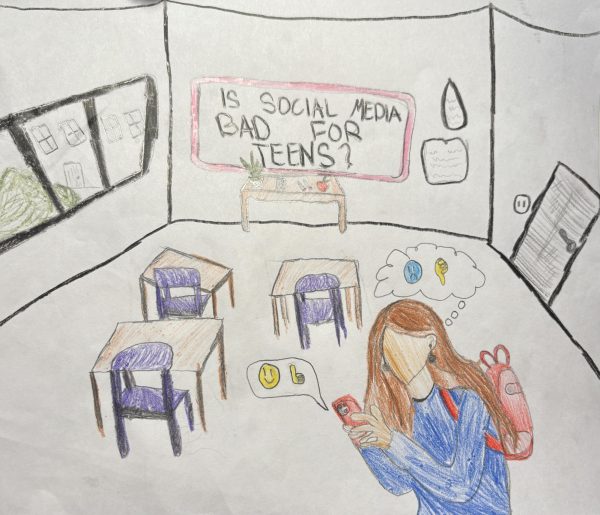How much is too much?
Excessive homework, lack of student input has lead to a broken system, poor student health
Sophomores Jewel New and Lily Christie work on their numerous homework assignments after school. New points out that it’s unfair and counterproductive to assign an extraneous amount of homework following a seven-hour school day.
November 7, 2019
According to the Stanford University Office of Communications, 56 percent of students reported homework to be their primary source of stress.
At a large table inside Thunderbird Coffee, not knowing how we would ever complete the everlasting list of assignments we had due that week, my friends and I sat studying for an exam which had most of the sophomore class anxious and on the edge of their seats the entire week: the first World History AP test.
This would be our first AP exam ever, so the nerves were expected. My friends and I were gathered for a study group at the coffee shop, preparing ourselves for a practice AP test, which replicates the real test, which we’ll take in the fall. As I copied words and definitions to help remember information, a friend of mine, Jewel New, who sat across from me said something that sparked my interest.
She asked, “Why do we go to school for seven and a half hours a day just to go home and do hours more of work?” I’ve heard time and time again on social media and from classmates that as a student, they don’t hate school, and they don’t mind the workload they’re given while there, but what makes them dread the education system is the work they bring home with them at the end of the day.
Some teachers would argue, however, that homework is necessary, but is it really? How do you determine what homework is necessary and what’s excessive? And why are students not more involved in these types of decisions regarding their education?

According to the Stanford University Office of Communications, 56 percent of students reported homework to be their primary source of stress. Photos by Elisha Scott.
Now, I will agree that certain types of homework are definitely necessary, but it depends a lot on the actions of the students in class. If a student is given a reasonable amount of time to work on an assignment in class and has been informed that this is the last or only class time they will be given to work on it, it’s practical for the teacher to ask a student to complete the assignment at home if it’s not completed in class. Certain electives also require homework for assignments not finished in class, many of which would be impossible to complete during just class time.
For example, we at The Shield have to work outside of class and come in after school to work on our stories and pages in order to compose a well-developed online and print issue. Other classes, like art, choir, or band, might require you to do some work outside of class as well. In these cases, this work is fair as long as time is given in class to help reduce the amount of time a student needs to spend each night on homework. Some teachers might argue that students won’t take advantage of this time and just mess around, but I think this should be a student’s choice. If they feel that they are already prepared or would rather be in a different environment to study, then they should be allowed to work on something else as long as they don’t disrupt the class.
The biggest issue with studying and completing important work, however, is having loads of other homework piled on top of it which leads to poor study habits and not enough time to complete the assigned work; therefore, we must eliminate this extra work, which can be done in class or simply isn’t necessary.
The main issue is the lack of student opinion and involvement in their education.
For example, worksheets over math problems or an English book every day, or notes over a reading assigned every class period are excessive and add unnecessary stress to a student’s day, negatively affecting their well-being. With eight classes total, how is it fair for a student to be expected to do a hour’s worth of homework for each class? This leaves no time for a student’s social life, family time or relaxation.
It can also lead to sleep deprivation and mental health issues. According to the Stanford University Office of Communications, 56 percent of students reported homework to be their primary source of stress.
“The results offer empirical evidence that many students struggle to find balance between homework, extracurricular activities and social time,” the report goes on to say. “Many students felt forced or obligated to choose homework over developing other talents or skills.”
Teachers, however, aren’t the sole factor, in this excessive amount of outside work. A change in the classroom isn’t exactly realistic without a change in the school system, starting with the amount of curriculum that is crammed into each school year. While they do have the right motives, intending to teach kids as much as possible during their 13 years (give or take) in the education system, school system officials don’t take into account how much information a student can really retain before reaching their breaking point and tuning it out.

According to a study done by the National Alliance on Mental Illness, “1 in 6 U.S. youth aged 6-17 experience a mental health disorder each year.” Mental illness in teens has become an increasing problem and much of this is brought on by the stress of excessive work after a long school day.
I often find myself only remembering what I need to remember for the test and then forgetting the information at the start of the following unit until finals. I have several friends and acquaintances who are in the same English, science and math classes that I took last year, but when they ask me questions pertaining to the material I learned, I can’t remember it because I was learning so much that I wasn’t able to retain all of it.
Thus, something must change.
During that same conversation with my friends, an idea sparked my interest as we bounced around solutions to this stressful issue. What if we had longer school days, meaning more time in each class, to reduce the hours of homework each night. Getting up an hour earlier and leaving an hour later could make all the difference to the amount of homework taken home. And it wouldn’t be as hard to get up an hour earlier if you’re not staying up as long for homework. Classroom time could be structured to include both instructional and work time so a student can do more work in class to help remember it rather than taking it home to hurriedly do it the night (or even morning) before it’s due.
A change in the classroom isn’t exactly realistic without a change in the school system.
Our class periods are already pretty long with block schedule, so adding on more time and a break so that students aren’t expected to do worksheets and extraneous notes at home could be extremely beneficial and wouldn’t be a drastic change. Students could also be supplied with optional work to do on their own time if they wish to practice and remember for times when there are multiple days between two class periods.
There is no clear solution to the problem of excessive work and the stress it creates. In order to find a solution which fits everyone’s best interest, you need the insight of not only the school district and faculty, but the students as well. The main issue is the lack of student opinion and involvement in their education which are exemplified by the high stress levels we see in today’s schools. We can’t define excessive when it comes to homework and schoolwork in general; however, it is evident that a change must be made to prevent further destruction of the school system and student health.
















Evelyn Griffin • Dec 2, 2019 at 10:25 am
The idea of a longer school day sounds bad at first, but I think that could be very beneficial. Good work, Elisha!